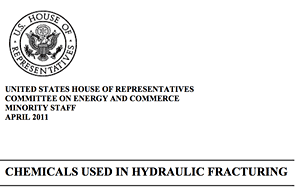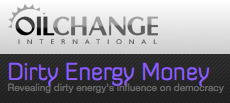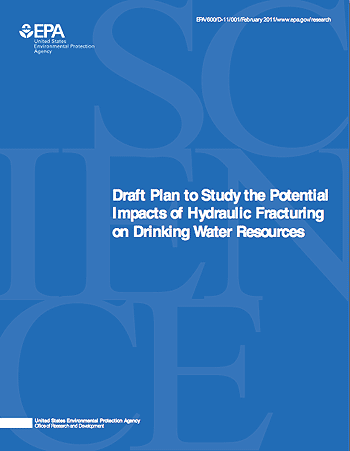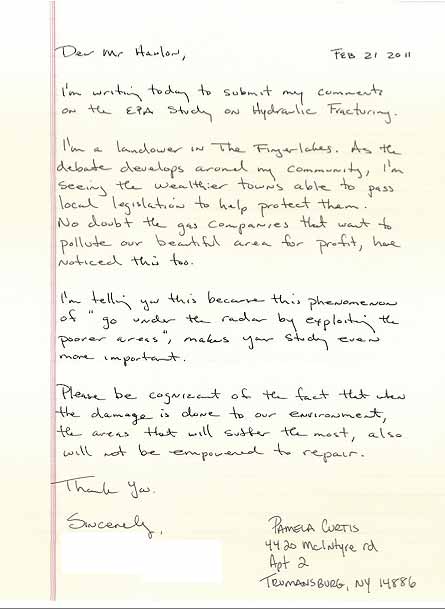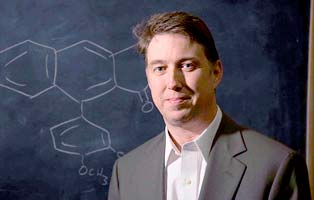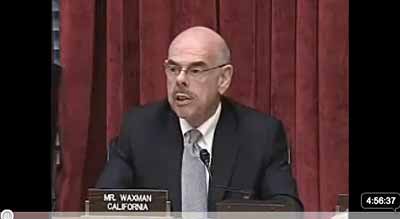Contains the keyword government
Apr 16, 2011
Today Energy and Commerce Committee Ranking Member Henry A. Waxman, Natural Resources Committee Ranking Member Edward J. Markey, and Oversight and Investigations Subcommittee Ranking Member Diana DeGette released a new report that summarizes the types, volumes, and chemical contents of the hydraulic fracturing products used by the 14 leading oil and gas service companies.
The report contains the first comprehensive national inventory of chemicals used by hydraulic fracturing companies during the drilling process.
“Hydraulic fracturing has helped to expand natural gas production in the United States, but we must ensure that these new resources don’t come at the expense of public health,” said Rep. Waxman.
“This report shows that these companies are injecting millions of gallons of products that contain potentially hazardous chemicals, including known carcinogens. I urge EPA and DOE to make certain that we have strong protections in place to prevent these chemicals from entering drinking water supplies.”
See: U.S. Congress. Committee on Energy and Commerce. Minority Staff (Henry Waxman, Edward Markey, Diana DeGette). "Chemicals Used in Hydraulic Fracturing". Washington, D.C. April 2011. (PDF)
Universal Well Services, for example, told the Committee that it “obtains hydraulic fracturing products from third-party manufacturers, and to the extent not publicly disclosed, product composition is proprietary to the respective vendor and not to the Company.”31
Complete Production Services noted that the company always uses fluids from third-party suppliers who provide an MSDS for each product. Complete confirmed that it is “not aware of any circumstances in which the vendors who provided the products have disclosed this proprietary information” to the company, further noting that “such information is highly proprietary for these vendors, and would not generally be disclosed to service providers” like Complete.32
Key Energy Services similarly stated that it “generally does not have access to the trade secret information as a purchaser of the chemical(s).”33
Trican also told the Committee that it has limited knowledge of “off the shelf” products purchased from a chemical distributor or manufacturer, noting that “Trican does not have any information in its possession about the components of such products beyond what the distributor of each product provided Trican in the MSDS sheet.”34
In these cases, it appears that the companies are injecting fluids containing unknown chemicals about which they may have limited understanding of the potential risks posed to human health and the environment.
VI. CONCLUSION
Hydraulic fracturing has opened access to vast domestic reserves of natural gas that could provide an important stepping stone to a clean energy future. Yet questions about the safety of hydraulic fracturing persist, which are compounded by the secrecy surrounding the chemicals used in hydraulic fracturing fluids.
This analysis is the most comprehensive national assessment to date of the types and volumes of chemical used in the hydraulic fracturing process.
It shows that between 2005 and 2009, the 14 leading hydraulic fracturing companies in the United States used over 2,500 hydraulic fracturing products containing 750 compounds. More than 650 of these products contained chemicals that are known or possible human carcinogens, regulated under the Safe Drinking Water Act, or listed as hazardous air pollutants.
31. Letter from Reginald J. Brown to Henry A. Waxman, Chairman, Committee on Energy and Commerce, and Edward J. Markey, Chairman, Subcommittee on Energy and Environment (Apr. 16, 2010).
32. Letter from Philip Perry to Henry A. Waxman, Chairman, Committee Energy and Commerce, and Edward J. Markey, Chairman, Subcommittee on Energy and Environment (Aug. 6, 2010).
33. E-mail from Peter Spivack to Committee Staff (Aug. 5, 2010).
34. E-mail from Lee Blalack to Committee Staff (July 29, 2010).
by Ian Urbina:
Oil and gas companies injected hundreds of millions of gallons of hazardous or carcinogenic chemicals into wells in more than 13 states from 2005 to 2009, according to an investigation by Congressional Democrats.
...“Questions about the safety of hydraulic fracturing persist, which are compounded by the secrecy surrounding the chemicals used in hydraulic fracturing fluids,” said the report, which was written by Representatives Henry A. Waxman of California, Edward J. Markey of Massachusetts and Diana DeGette of Colorado.
...Some of the ingredients mixed into the hydraulic fracturing fluids were common and generally harmless, like salt and citric acid. Others were unexpected, like instant coffee and walnut hulls, the report said. Many of the ingredients were “extremely toxic,” including benzene, a known human carcinogen, and lead.
...Ms. Degette, and Representative Maurice D. Hinchey, Democrat of New York, recently reintroduced the FRAC Act, a bill that would require chemical disclosure from all drilling companies, including a provision that companies release proprietary information to health professionals if it is needed for treatment. The FRAC Act would also create an online registry of chemicals on a well-by-well basis, but it would require drillers to disclose what they plan to use before they fracture a well, as well as a post-fracturing report.
See: Urbina, Ian. “Millions of Gallons of Hazardous Chemicals Injected Into Wells, Report Says.” The New York Times 16 Apr. 2011. Web. 17 Apr. 2011.
See also: Texas Oil and Gas Acciountability Project. The Dark Side of the Boom: How Natural Gas Drilling in Texas Threatens Public Health and Safety: Sen. Lon Burnam Joins Calling for ‘Urgent’ Reforms
Thursday, April 14, 2011
Flowback: How the Texas Natural Gas Boom Affects Health and Safety
TEXAS OIL & GAS ACCOUNTABILITY PROJECT
FOR IMMEDIATE RELEASE: April 14, 2011
The Dark Side of the Boom: How Natural Gas Drilling in Texas Threatens Public Health and Safety: Sen. Lon Burnam Joins Calling for ‘Urgent’ Reforms
AUSTIN, TX, APRIL 14 – State, local and federal officials and regulatory agencies are failing to protect Texans from the health and safety risks of the natural gas boom, according to a report released today by the Texas Oil & Gas Accountability Project (OGAP).
What the heck am I looking at?
We've created maps of political campaign contributions from companies in the oil & gas and coal industries to congressional representatives. These are relationship map of the contribution network. That means that unlike a physical map, where points are positioned at a geographic location, the icons for the companies and representatives are placed so that they are as close as possible to whomever they contribute to or receive contributions from.
Think of it like a social networking site in which companies and politicians have become 'friends' by giving money.
This site is a project of Oil Change International, developed by Greg Michalec and Skye Bender-deMoll and designed by Diligent Creative. Earlier versions of the site were named 'Follow the Oil Money' and 'Follow the Coal Money'.
 EPA's Draft Hydraulic Fracturing Study Plan
EPA's Draft Hydraulic Fracturing Study Plan
 Science Advisory Board Public Comments Letters from the Public. March 7, 2011. Posted to Web.
Science Advisory Board Public Comments Letters from the Public. March 7, 2011. Posted to Web.
You can read all the form letters submitted from Texas, as well as my letter here:
| Public comment submitted to the SAB Staff Office | Public Comments submitted by Neil Zusman, Ithaca, NY-2-28-11. (PDF, 3 pp., 118,694 bytes) |
"The States have not shown that they can adequately regulate gas drilling, especially in more populated areas. Federal Regulations are clearly needed.
Time and time again, as noted by a Pew Research Group report, a wide variety of industries, in seat belts, lead paint, cigarettes and many others, have fought federal regulation only to have history prove that it never hurt their bottom line." (Neil Zusman, 2011-02-28).
See: Pew Environment Group (PEG) Factsheet: Industry Opposition to Government Regulation (PDF), October 14, 2010.
See: Letter from Thomas Curtis, AWW. Website below:
In summary, AWWA supports protecting of sources of drinking water under any and all circumstances, including hydraulic fracturing. We appreciate the agency’s consideration of our comments. If there are any questions about these comments, please direct them to Alan Roberson, AWWA, at (202) 326-6127.
Yours Sincerely,
Thomas W. Curtis Deputy Executive Director
See this hand-written letter by Pamela Curtis of Trumansburg, New York:
See: Federal Register: Science Advisory Board Staff Office; Notification of a Public Meeting of the Science Advisory Board Panel for the Review of EPA's Hydraulic Fracturing Study Plan. EPA Notice: 2/09/11.
The Environmental Protection Agency (EPA or Agency) Science Advisory Board (SAB) Staff Office announces a public face-to-face meeting of the SAB Panel to conduct an independent review of EPA's Draft Hydraulic Fracturing Study Plan.
The meeting will be held on March 7, 2011 from 9 a.m. to 5 p.m., and March 8, 2011 from 8 a.m. to 5 p.m. (Eastern Time).
The Panel meeting will be held at the Westin Alexandria Hotel located at 400 Courthouse Square, Alexandria, VA 22314.
Members of the public can submit comments for a federal advisory committee to consider as it develops advice for EPA. They should send their comments directly to the Designated Federal Officer for the relevant advisory committee.
Oral Statements: In general, individuals or groups requesting an oral presentation at this public meeting will be limited to five minutes per speaker. Interested parties should contact Mr. Edward Hanlon, DFO, in writing (preferably via e-mail), at the contact information noted above, by February 28, 2011 to be placed on the list of public speakers for the meeting.
Written Statements:
Written statements should be received in the SAB Staff Office by February 28, 2011 so that the information may be made available to the SAB Hydraulic Fracturing Study Plan Review Panel for their consideration.
In its Fiscal Year 2010 budget report, the U.S. House of Representatives Appropriation Conference Committee identified the need for a focused study of this topic. EPA scientists, under this administration and at the direction of Congress, are undertaking a study of this practice to better understand any potential impacts of hydraulic fracturing on drinking water and groundwater. EPA consulted with experts in the field through peer review, and technical workshops and engaged stakeholders in a dialogue about the study through facilitated public meetings.
EPA has submitted its draft study plan on hydraulic fracturing for review to the agency's Science Advisory Board (SAB).
The overall purpose of the study is to understand the relationship between hydraulic fracturing and drinking water resources. The scope of the proposed research includes the full lifespan of water in hydraulic fracturing, from acquisition of the water, through the mixing of chemicals and actual fracturing, to the post-fracturing stage, including the management of flowback and produced water and its ultimate treatment and disposal.
The SAB plans to review the draft plan March 7-8, 2011. Consistent with the operating procedures of the SAB, an opportunity will be provided for stakeholders and the public to provide comments to the SAB during their review. The Agency will revise the study plan in response to the SAB's comments and promptly begin the study. Initial research results are expected by the end of 2012 with a goal for a report in 2014.
See: Industry responds to public take on hydraulic fracturing | Fracking Resource Guide
See: EPA Hydraulic Fracturing Study Plan Review Panel
See: Lisa P. Jackson, EPA (lisapjackson) on Twitter
See: U.S. Congress. Committee on Space, Science, and Technology. "Hearing Highlights Lack of Objectivity in Draft EPA Fracking Study--No Evidence of Drinking Water Contamination from Fracking, Witnesses Say". May 11, 2011
Hydraulic Fracturing Study Plan Review Panel
The Panel will review and provide independent expert advice on EPA’s draft Hydraulic Fracturing Study Plan that will investigate the potential public health and environmental protection research issues that may be associated with hydraulic fracturing.
It will be led by David A. Dzombak, professor of environmental engineering at Carnegie Mellon University.
Legere, Laura. "Peer-review panel for EPA fracking study includes six Pa. scientists." The Scranton Times-Tribune. Jan. 18, 2011.
A panel of geologists, toxicologists, engineers and doctors that will peer-review a high-profile Environmental Protection Agency study of hydraulic fracturing will include six scientists from Pennsylvania, more than any other state.
The panel will review the techniques and analysis the EPA uses to draft a study of the potential environmental and health impacts of hydraulic fracturing - the process used in natural gas exploration of injecting a high-pressure mix of chemically treated water and sand underground to break apart a rock formation and release the gas.
...In a memo announcing the new panel, the EPA found "no conflicts of interest or appearances of a lack of impartiality for the members of this panel."
See: Natural Gas Drillers Protest Nomination of Fracking Critics for EPA Review Panel
See also: Hydraulic Fracturing Study Plan
Determination Memo:
Posted 01/13/2011
Determination Memo for this Activity. (1/27/2011, PDF, 11 pp., 44,581 bytes)
Members:
| Dzombak, David A. | Chair | Carnegie Mellon University | Pittsburgh | PA |
| Alexeeff, George | California Environmental Protection Agency | Oakland | CA | |
| Ballestero, Tom | University of New Hampshire | Durham | NH | |
| Benjamin, Mark | University of Washington | Seattle | WA | |
| Boufadel, Michel | Temple University | Philadelphia | PA | |
| Boyer, Elizabeth | Pennsylvania State University | University Park | PA | |
| Burnett, David | Texas A&M University | College Station | TX | |
| Davis, Thomas L. | Colorado School of Mines | Golden | CO | |
| Dunn-Norman, Shari | Missouri University of Science and Technology | Rolla | MO | |
| Giesy, John P. | University of Saskatchewan | Saskatoon | Saskatchewan | |
| Griffiths, Jeffrey | Tufts University | Boston | MA | |
| Gschwend, Phillip | Massachusetts Institute of Technology | Cambridge | MA | |
| Harris, Cynthia M. | Florida A&M University | Tallahassee | FL | |
| Kim, Nancy K. | Health Research, Inc. | Troy | NY | |
| Lee, Cindy M. | Clemson University | Anderson | SC | |
| Patten, Duncan | Montana State University | Bozeman | MT | |
| Randtke, Stephen | University of Kansas | Lawrence | KS | |
| Reible, Danny | University of Texas | Austin | TX | |
| Schreppel, Connie | Mohawk Valley Water Authority | Utica | NY | |
| Thyne, Geoffery | University of Wyoming | Laramie | WY | |
| VanBriesen, Jeanne | Carnegie Mellon University | Pittsburgh | PA | |
| Vidic, Radisav | University of Pittsburgh | Pittsburgh | PA |
GEMS: Great Environmental Moments in Science |
||
|
||
|
||
|
Executive Message:
...As an agency, we are ready to face scientific challenges in 2011 that range from mountain top mining to hydraulic fracturing to endocrine disruption and more. But the reason it’s so important to invest in the kind of new thinking, methods, and approaches that Administrator Jackson has called for, is to ensure our ability to take on those challenges we can’t foresee. Innovative thinking and sustainable approaches will be out best tools to confront new environmental challenges as they arise.
Sincerely,
Paul T. Anastas
Assistant Administrator
U.S. EPA
Office of Research and Development
The Continental Center and KBR Tower (foreground) in downtown Houston.
Photo by Blair McFarlain.
The London lawyer accused by American authorities of helping KBR and its partners bribe Nigerian officials lost his battle against extradition yesterday.
The British High Court affirmed a decision to send Jeffrey Tesler, 62, a U.K. citizen, to Houston to answer criminal charges in federal court. He faces up to 55 years in prison and forfeiture of more than $132 million.
Tesler was indicted in February 2009. He was charged with one count of conspiracy to violate and ten counts of violating the FCPA. The DOJ alleges he was part of a decade-long scheme to bribe Nigerian government officials in exchange for contracts worth $6 billion to build liquefied natural gas facilities on Bonny Island, Nigeria.
His co-defendant, Wojciech Chodan, KBR's former commercial vice president at a U.K. subsidiary, was extradited from Britain in December last year. He pleaded guilty in Houston federal court to conspiring to violate the FCPA.
Chodan's sentencing is scheduled for February 22, 2011. He faces up to five years in prison on the conspiracy charge. As part of his plea agreement, Chodan, 72, who's also a U.K. citizen, agreed to forfeit $726,885.
See: Barry Meier and Clifford Krauss. "Inquiry Puts Halliburton in a Familiar Hot Seat". NYT Business Day. October 28, 2010.
Last year, for example, Halliburton and KBR agreed to pay $579 million to settle charges brought by the Justice Department and the Securities and Exchange Commission in connection with bribes that KBR had paid to top Nigerian officials over a decade. The companies still face criminal liability in Nigeria over the episode, which involved contracts to build a liquefied natural gas complex.
See: Snamprogetti, ENI In $365 Million Settlement
See: Fracking Resource Guide | Halliburton (updated)
Richard L. Cassin lived in the Middle East and Asia for 25 years. Before founding Cassin Law LLC, he was a senior partner in a major international law firm and managing partner of its Asia practice in Singapore, Hong Kong and Beijing.
He helps clients comply with the Foreign Corrupt Practices Act and other U.S. laws, and regularly assists companies facing compliance issues.
Get Involved
If you think you might be affected by a proposed natural gas or hydroelectric project regulated by the Commission, you have certain rights. These rights range from being able to look at project correspondence to becoming an intervener and being able to appeal any FERC decisions in federal court.
The Commission's Citizen's Guides are a good place to start.
|
Should I Get Involved? Only you can ultimately answer this but we can help you think things through. Read More. |
How to Get Involved Take advantage of a suite of electronic services to easily get involved. Still prefer paper? That's fine too. Read more. |
The Process Natural gas and hydropower projects have distinct processes. This overview will help you to participate. Read More |
The Federal Energy Regulatory Commission, or FERC, is an independent agency that regulates the interstate transmission of electricity, natural gas, and oil.
Contains sections on how to file a Freedom of Information Act (FOIA) request, Enforcement, Legal Resources, Dispute Resoulution Service (DRS), etc.
Of the over 400 amendments offered on the House government-funding measure, the 2011 Continuing Resolution (H.R. 1), dozens are focused on climate change, energy policy, and environmental protection. The existing language in the budget bill is already designed to deny global warming, slash and burn public health and green jobs, but the amendments would take even more radical steps to reward polluters who are killing our children’s future. Republican amendments, if fully enacted, would:
– Eliminate the White House Council on Environmental Quality, the Special Envoy for Climate Change, the Assistant to the President for Energy and Climate Change, the NOAA Climate Service, the Department of Energy’s ARPA-E, National Science Foundation K-12 funding
– Block US funding for the Intergovernmental Panel on Climate Change and the Global Environment Facility
– Suspend enforcement of fisheries laws and construction and conservation acquisition programs of the National Parks and Department of the Interior
– Block rules for cement plant pollution, coal ash, industrial boiler pollution, water quality, climate change pollution, climate change adaptation, energy-efficient lighting, mountaintop removal, atrazine, and water conservation.
"Most of these amendments are budget neutral, not lowering the deficit one cent. Several defund extremely effective jobs programs that cost only a few million dollars. The goal of these amendments is not fiscal responsibility or jobs creation, but polluter protection, even though the pollution is poisoning babies, causing the elderly to suffer, and destroying America’s natural bounty.
Max Shelby | Vincent Alabama said, find how your representative voted and give 'em hell!
These were revenue-neutral amendments, meaning they weren’t aimed at reducing the federal budget deficit, but were designed solely to prevent the EPA and other government agencies from updating and enforcing clean air and clean water laws. In short, it was Christmas for polluters.
Profile
Brad Johnson is a climate researcher-blogger at the Center for American Progress Action Fund. He blogs at the ThinkProgress Wonk Room on the climate crisis, energy policy and building a green economy.
See: A Life’s Value May Depend on the Agency, but It’s Rising
Joshua Tauberer is the “grandfather” of the open-data movement for the U.S. Congress and a “data crusader”.
GovTrack.us, launched in 2004, was the first website to apply the principles of open data and Web 2.0 to the U.S. Congress. It catalyzed the development of a community of like-minded developers and shaped the data-oriented open government movement that we see today.
See: Marshall Kirkpatrick. "Data Hacker Pageranks Members of the US Congress." ReadWriteWeb. Dec. 27, 2010.
See: Dirty Energy Money.
Today, Republicans in the House energy committee voted not once, not twice, but three times [all PDFs], against amendments recognizing that climate change is real, despite the broad scientific consensus that "climate change is happening and human beings are a major reason for it." They then unanimously voted [PDF] in favor of the Upton-Inhofe bill to repeal the EPA's scientific endangerment finding on greenhouse pollution.
The 31 Republicans and three Democrats who voted in favor of H.R. 910 have received a grand total of $343,750 from Koch Industries, an average of more than $10,000 each. Freshman Mike Pompeo (R-Kan.), Koch's special man in Congress, tips the scales at $79,500.
But today's vote is not the first time the Commitee From Koch went public on their science denial.
[Following is] a survey of the members of the committee, fueled by support from Koch Industries and other polluters, and their proclaimed opposition to climate science and climate scientists...
See for yourself. Chairman Upton, Rep. Barton, Rep. Waxman, et al. "Full Committee Markup on "H.R. 910" and "H.J. Res. 37" (Continued)". YouTube. (Running Time - 4:56:37).
See: Comments from Committe on Energy and Commerce Democrats:
Letter in Opposition from Scientists: "The EPA must be allowed to fulfill its responsibilities and take action to regulate global warming emissions under the Clean Air Act. This science-based law has prevented 400,000 premature deaths and hundreds of millions of cases of respiratory and cardiovascular disease during the 40 years since it was first passed5—all without diminishing economic growth."
Letter in Opposition from National Academy of Sciences: "We are deeply disturbed by the recent escalation of political assaults on scientists in general and on climate scientists in particular. All citizens should understand some basic scientific facts."
Letter in Opposition from Former Senior Military Officers: "America’s dependence on oil constitutes a clear and present danger to the security and welfare of the United States. As former senior military officers, we are concerned about Congressional efforts to undermine the Environmental Protection Agency’s regulatory authority that is critical to reducing our dependence on oil."
Letter in Opposition from Health and Medical Professionals: "Please fulfill the promise of clean, healthy air for all Americans to breathe. Support full implementation of the Clean Air Act and resist any efforts to weaken, delay or block progress toward a healthier future for all Americans."
Letter in Opposition from the American Public Health Association: "Cimate change is a public health issue and is one of the greatest threats to human health. Scientists from across the globe have stated in the strongest possible terms that the climate is changing and that human activity is to blame."
Letter in Opposition from Organizations: "This reckless legislation puts America’s health, prosperity, and national security at risk by gutting the Clean Air Act, overturning a decision of the Supreme Court, and dismantling the Environmental Protection Agency’s ability to address life-threatening carbon dioxide and other pollution."
Letter in Opposition from Health Organizations: "This legislation would block the EPA from setting sensible safeguards to protect public health from the effects of air pollution."
Letter in Opposition from the American Lung Association: "A recent bipartisan survey... indicates the overwhelming view of voters: 69 percent think the EPA should update Clean Air Act standards with stricter limits on air pollution; 64 percent feel that Congress should not stop the EPA from updating carbon dioxide emission standards; 69 percent believe that EPA scientists, rather than Congress, should set pollution standards."
See: Broder, John M. 2011. House Panel Votes to Strip E.P.A. of Power to Regulate Greenhouse Gases. The New York Times, March 10, sec. Science / Environment.
See: Reeve, Elspeth. 2011. House Energy Panel Curbs Federal Power to Fight Climate Change - Politics - The Atlantic Wire. The Atlantic Wire. March 16.
See: EPA chief faces hostile House GOP
See: Smackdown: climate science vs. climate economics.
See: Climate Co-benefits and Child Mortality Wedges.
See: Snubbing Skeptics Threatens to Intensify Climate War,
See: Climate Zombies Now Run The House.
See: GOP Budget Amendments Would Destroy Health, Economy, Planet
See: EPA chief faces hostile House GOP
See: Energy & Commerce Committee Investigates Potential Impacts of Hydraulic Fracturing
For one of the more articulate conservative bloggers viewpoints on climate change and its' hermeneutics, read Alberta, Canada's Kevin Libin at ClimateRealists and The National Post.
See: Libin, Kevin. 2011. "Kevin Libin: Environmental activists hide behind a screen of U.S. money." National Post.
For an embarassing account of the dangers of environmentalism, see: Beware The Green Dragon! | Right Wing Watch.







